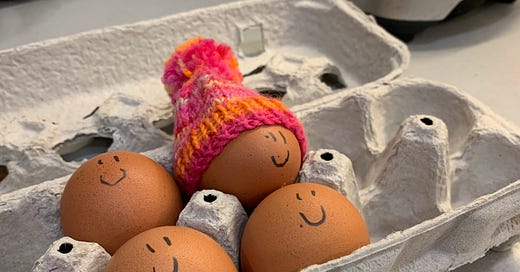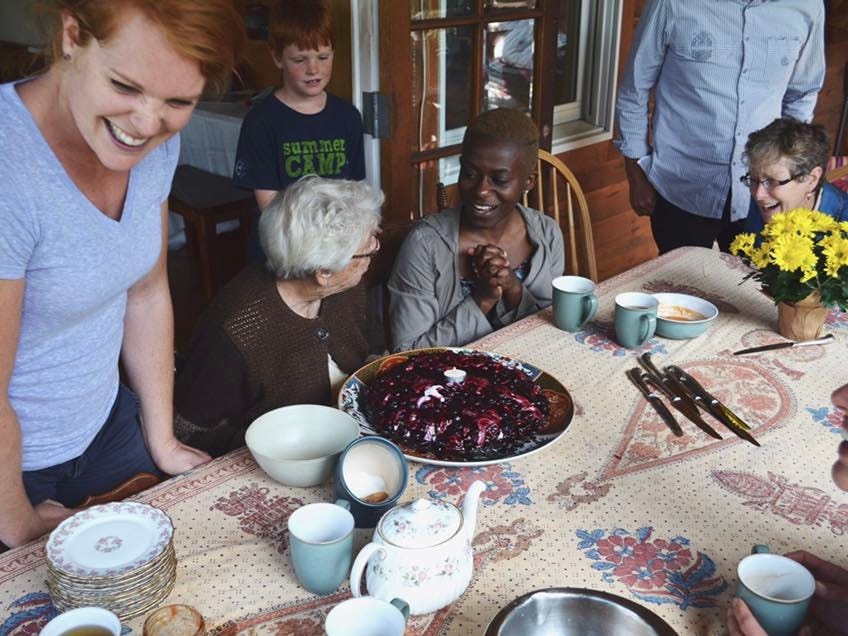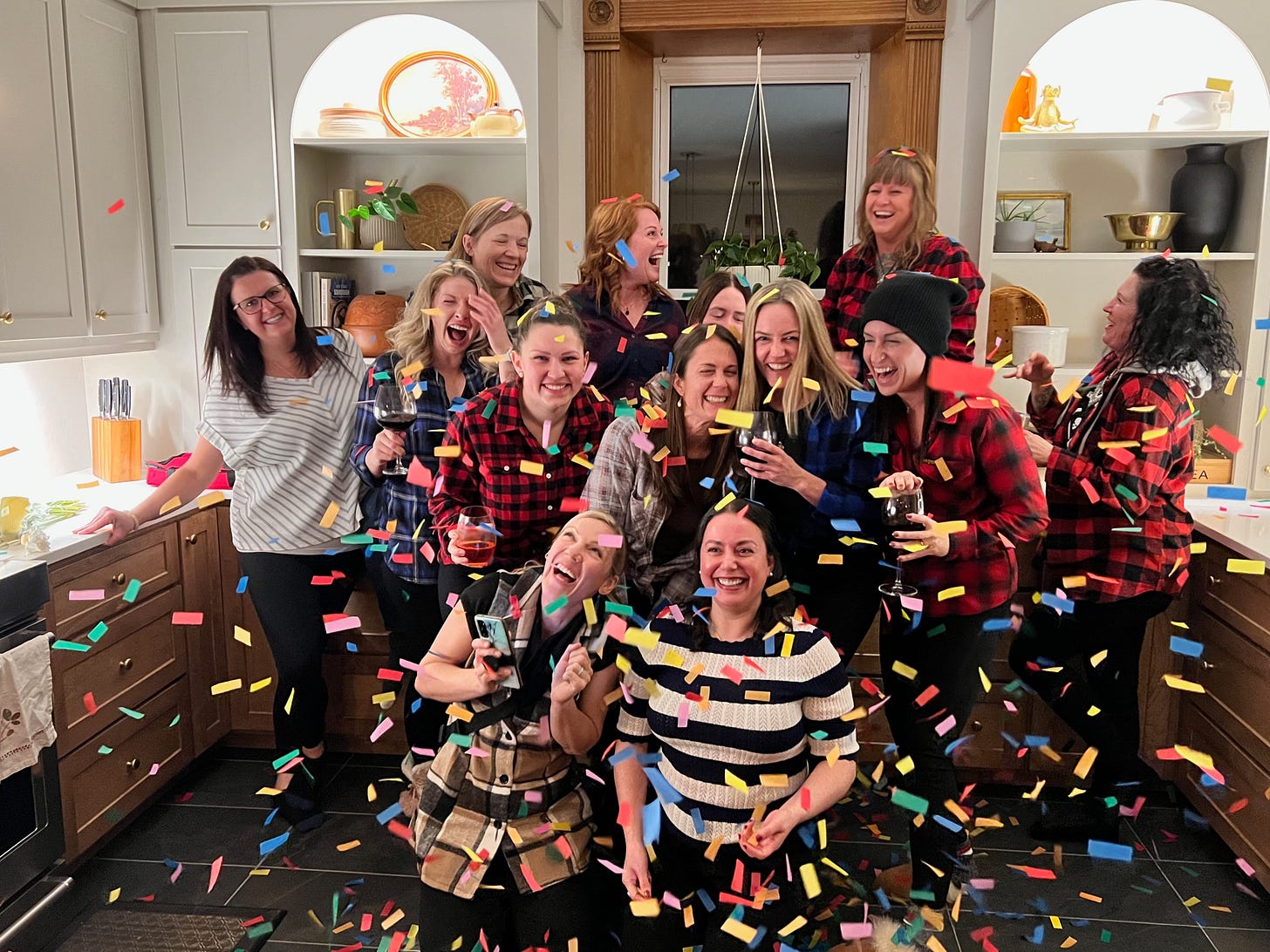My favourite part about giving book talks is the Q&A afterward. Digital minimalism is a contentious topic, and I love how the audience never fails to weigh in boldly with questions and stories. Everyone gets involved, sharing their opinions and advice, and inevitably I come away with lots to think about on the drive home.
After this week’s presentation at the Toronto Waldorf School, I’ve been mulling over one mother’s question, in particular. She said she recognizes that her child’s downtime should be spent in more rewarding ways than watching YouTube shows or playing video games, but then she asked:
“What about me? Sometimes I just need a break and don’t want to do housework, so I scroll on my phone. What do you think I should be doing?”
It was a dense and important question. I did my best to answer it in the moment, but have continued to think about it since. The result is this post, which is essentially the adult version of a post I wrote recently called “On Filling the Void.”
Activity Over Passivity
That mother is right that we parents need a break. Not every free minute can or should be redirected toward productivity, managing a household, cooking dinner, folding laundry, or vacuuming. That would be exhausting and demoralizing. So, I acknowledge the craving to scroll mindlessly and, indeed, I succumb to it myself more often than I’d like to admit.
But there is a bigger philosophical question at stake: How do we want to use our time? I think that the predominance of smartphones in our parental lives has caused us to lose sight of the many other wonderful things that we used to do before we had a frictionless source of immediate distraction at our fingertips.
There is a further sense that, because we are doing so much else, we are entitled to the empty scrolling; we have “earned” it because God knows we’re worked to the bone trying to juggle everything else. The idea of rallying effort and focus to fill a lull between parental duties strikes many parents as horrifying and exhausting.
This comes at a cost. When we tell ourselves that we deserve to flick through TikTok videos or gawk at our Instagram newsfeed, we are shortchanging ourselves, settling for a lower-quality lifestyle that has few rewards for us. Ultimately, scrolling does not make us happier, better, or more interesting humans; if anything, it adds to our stress and self-doubt.
What this means is that we have to retrain ourselves to do other things whenever we have quiet time or need a break. We need to strive to ignore the phone and seek alternatives.
Cal Newport urges people to reclaim “high-quality leisure” in his book, Digital Minimalism. He maintains that “the value you receive from a pursuit is often proportional to the energy invested” and that the most successful digital minimalists are the ones who establish high-quality leisure activities in their lives before attempting to eliminate devices. By setting themselves up with alternative things to do, these digital minimalists are less inclined to scroll.
Related Article: The Profound Pleasure of Physical Tasks
What Are High-Quality Leisure Activities?
The answer is subjective. It will differ from person to person and is based on unique personalities and interests. But I’ll use myself as an example. I brainstormed a list yesterday while staring out my living room window. I asked myself, “What would I do if I didn’t have a phone and needed to check out from parenting for a little while?”
The list grew slowly at first, but then picked up momentum. I tried to recall things I used to do, way back in the early 2000s when I lived alone, pre-children and pre-smartphone.
Read a book, and maybe take it outside to soak up the sunshine.
Read aloud to my child.
Go for a walk. Do a workout.
Play a board game with my kids.
Take a nap. Go to bed early.
Soak in a bubble bath.
Go outside, putter around the yard, talk to a neighbour.
Make tea. Drink it.
Bake something for fun.
Do a facial mask. Paint my toenails.
Learn to mix some new cocktails.
Take one of those new cocktails into the bathroom to do my hair, so it’s nice for the week ahead.
Actively listen to music and learn lyrics by heart.
Practice violin. Learn my symphony part better.
Write in a journal.
Meet friends.
Relearn bossa nova guitar chord progressions that I once knew.
Call my mom.
I’d probably start chipping away at things that I’ve wanted to do for a long time, like learn to play piano. I have a quote from Ryan Holiday near my desk that says, “Start small… on something big.” Just 15 minutes of practice per day would get me a long way, but for some reason, I never start.
I also want to learn how to draw. My artist mother told me to get a copy of Drawing on the Right Side of the Brain, but I haven’t bothered because it doesn’t feel like I have enough time. Surely, I could squeeze this into my downtime, and no doubt I’d feel intensely satisfied afterward.
What Did Grandma Do?
Then my thoughts went toward my maternal grandmother, who never had a phone or Internet connection, and yet always seemed busy with numerous hobbies on the go. How did she spend her time?
She gardened and made spectacular flower arrangements in every room. She sat on her porch and watched birds at the feeder. She made dozens of handmade quilts. She made travel scrapbooks, wrote a daily journal entry, called her children and grandchildren weekly, mailed birthday cards to everyone, hosted friends for lunch, and volunteered in her community. She had a huge dollhouse (because she never had one as a child) that was meticulously decorated, with tiny electric lights. She only watched TV at night when she grew tired of reading. Her days were spent on tasks that may have appeared work-like, but also seemed to give her satisfaction and pleasure.
It seems that we, collectively, as a society, have forgotten that there is value in active pursuits and that relaxation can be found in doing and creating, not just lying on the couch and passively consuming.
The Lost Art of Having Fun
Too many of us adults have also forgotten how to have fun. We tell our kids, “Go outside to play,” but we forget to give ourselves permission to do the same thing. Why not go outside to lie in the sun, jump on the trampoline, run around the block? We need to place greater value on noticing what sparks joy in our hearts and gives us a thrill of excitement, and then pursue those activities on a regular basis. We have to ensure there is time and space for “supercharged socializing” in our lives.
Catherine Price does a great job writing about this in her latest book, The Power of Fun (and her Substack called How to Feel Alive). She points out that adding fun to adult life is a way of breaking up the monotony. I quote from a post I wrote last year called “The Forgettability of Sameness”:
When you start sprinkling fun, exciting, or challenging experiences (“small rebellions”) into your life, you swap out that smooth, indistinguishable chain for “the equivalent of a necklace made of colorful beads, each of which holds the potential to become, in the words of Johan Huizinga, ‘a treasure to be retained by the memory.’ The more distinct these beads are (and the more beads you collect each day), the more time will seem to slow down.”
Just Be
Finally, it’s important to remember that there is fulfillment to be had in just being—not doing much at all, but not allowing that time to get sucked into the social media/Internet vortex. Spending time in quiet contemplation is an ancient tool for promoting satisfaction. Don’t run away from it; sit with your thoughts, consider your life from various angles, and let awareness and understanding come into your mind.
If you don’t lunge for the phone at the slightest indication of quiet or boredom, then you will find other things to do or think about. And I am quite confident you’ll feel better off in the end.
In sum: Do things. Have fun. Just be. (And resist the phone.)
You Might Also Like:
When Adults Help Kids
On Finding Time for Creativity
Music in a Barn
I recently set up pledges for The Analog Family. If you enjoy my work, please consider making a financial pledge. This newsletter is a labour of love thus far, but it takes a lot of time and energy! Pledges are a wonderful motivator for this work that I consider to be more important than ever.
You can also show support by buying my book and leaving an Amazon review!







A tough part of this is that what I am craving when I pick up my phone, especially after 8 pm when my kid is in bed, is social connection. Apps easily allow for a form of social connection through dms, comments, seeing what other people post, etc. Obviously our phones have rewired our brains that we crave this social connection so much more and yet the connection it provides is shallow compared to IRL hangouts and such. I think there are deeper things at the root here - mostly capitalism and the 8 hour work day - that prevent what I am seeking.
Re: connection. I am trying to just call people more often: my mom, my sister, my best friend from college—even if it’s just five minutes.
Drawing in the Right Side of the Brain is a great book—and drawing is a great leisure time activity. For the less artistically inclined I find those adult coloring book delightful.
Other ideas: puzzles, crosswords, magazines, reading cookbooks for leisure, making a killer playlist, putting together cute outfits, audiobooks, making healthy snacks for the week, organizing something, stretching.